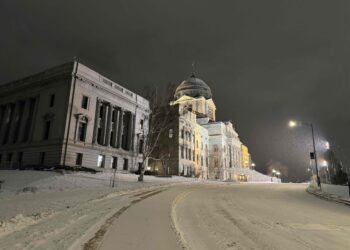ASSOCIATED PRESS
HELENA — The Montana Supreme Court heard arguments Wednesday over how the Public Service Commission should set the rates that NorthWestern Energy has to pay for power it’s required to buy from small solar projects.
The commission set rates in 2017 that would-be developers said would hurt the economic feasibility of small solar projects. The developers went to court, arguing the rates violated the federal Public Utility Regulatory Policies Act.
In 2016, Montana’s price for small qualifying facilities was $66 a megawatt hour. When the cost of solar panels decreased due to lower manufacturing costs, dozens of solar developers applied to build 3 megawatt projects to generate electricity that NorthWestern said it didn’t need. Two companies proposed a total of 43 3-megawatt projects, NorthWestern said at the time.
NorthWestern asked the commission to lower the rates to between $34 and $44 per megawatt hour.
The commission set the rate at $31 and shortened energy contracts from 25 years to 15 years after some long-term NorthWestern Energy price agreements left customers paying higher rates for electricity than they would have paid to purchase power on the open market, The Billings Gazette reported.
Attorneys for solar developers appealed, accusing NorthWestern of wanting to kill third-party energy development. A member of the commission was caught on a microphone acknowledging as much.
District Judge James Manley ordered the commission to reconsider the rate and to set the contract length to 25 years. The commission and NorthWestern appealed to the Montana Supreme Court.
On Wednesday, attorney Zachary Rogala for the commission asked the court to reinstate the 2017 rates, saying they were set based on well-accepted methods that determine the “avoided cost,” or the costs that NorthWestern Energy avoids paying for other electricity by using the renewable energy.
One of the main disagreements was whether the avoided cost should include a calculation of carbon taxes, which seemed much more likely under President Barack Obama’s administration than they do under President Donald Trump.
Developers of solar projects argue they need stronger prices and longer contracts to obtain financing and that carbon taxes are still a possibility under the federal Clean Air Act’s effort to reduce greenhouse gases.
Another issue is how much energy solar projects can provide to NorthWestern during times of peak demand.
“What we’re talking about is energy that is there when the load is highest, when we need it,” NorthWestern attorney Al Brogan told justices. This time of year, that tends to be after dark on cold days and at those times, solar projects “produce nothing for us.”
Solar developers argue NorthWestern also has peak usage on hot summer days, when they can provide needed electricity.
The Public Utility Regulatory Policies Act requires the commission to encourage the development of small renewable energy projects, said Jenny Harbine, an attorney for the Montana Environmental Information Center and Vote Solar.
However, it does not require consumers to pay more for the renewable power than they would for power from any other source and does not require the commission to use speculative costs, such as carbon taxes that do not yet exist, said Jason Brown with the Montana Consumer Counsel.
“Energy on the market now is cheap,” Brown argued. “When a utility’s avoided cost is low, fewer … projects can be economically developed.”
The commission and NorthWestern asked justices to uphold the commission’s rate decision while developers wanted justices to uphold Judge Manley’s ruling. The justices took the case under advisement.












